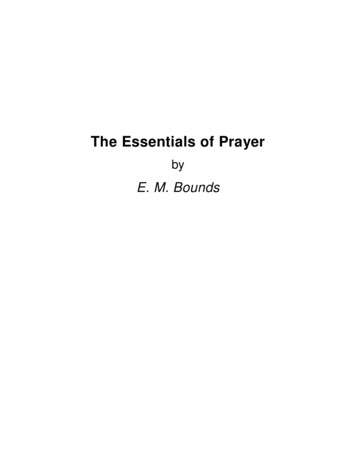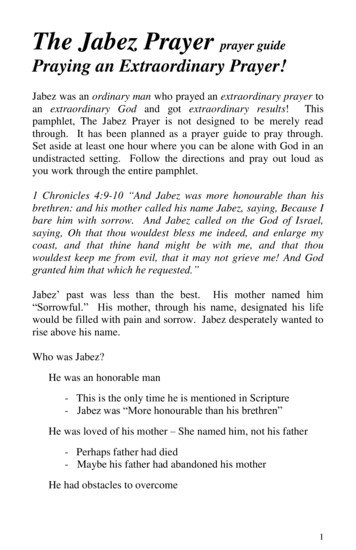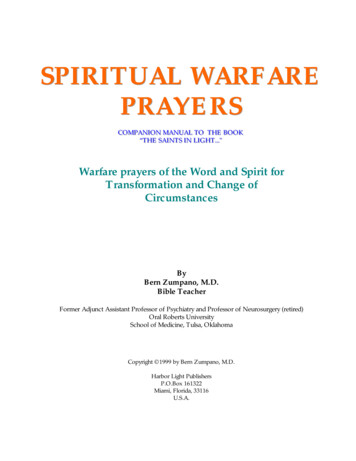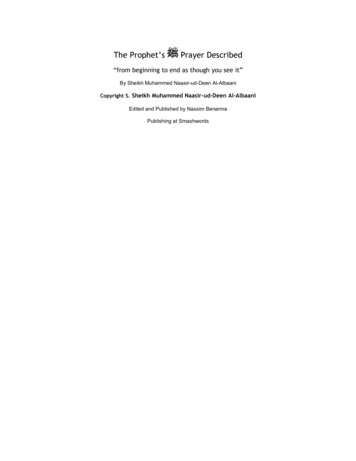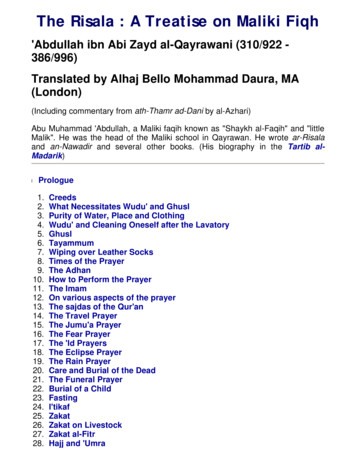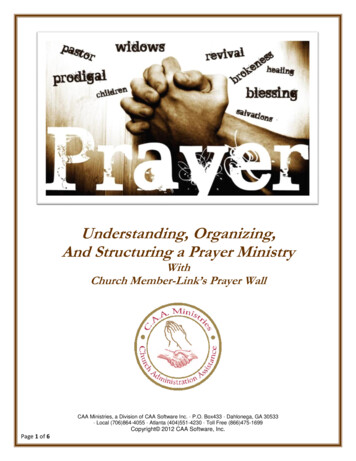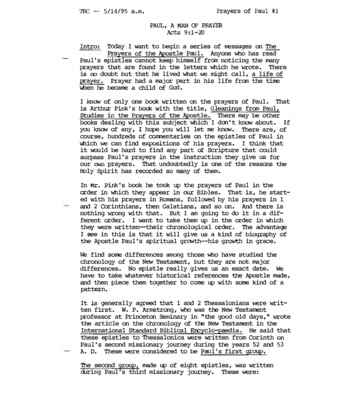
Transcription
TBC--Prayers of Paul #15/14/95 a.m.PAUL, A MAN OF PRAYERActs 9 : 1-20Intro:Today I want to begin a series of messages on ThePrayers of the Apostle Paul.Anyone who has readPaul's epistles cannot keep himself from noticing the manyThereprayers that are found in the letters which he wrote.is no doubt but that he lived what we might call, a life ofPrayer had a major part in his life from the timeprayer.nen he became a child of Goo.I know of only one book written on the prayers of Paul.Thatis Arthur Pink's book with the title, Gleanings from Paul,Studies in the Prayers of the Apostle.There may be otherboo ks dealing with this subject which I doo't know about.Ifyou know of any, I hope you will let me know.There are, ofcourse, hundreds of commentaries on the epistles of Paul in.nich we can find expositions of his prayers.I think thatit would be hard to find any part of Scripture that couldsurpass Paul's prayers in the instruction they give us forour own prayers. That undoubtedly is one of the reasons theHoly Spirit has recorded so many of them.In Mr. pink's book he took uporder in which they appear intheourprayers of Paul in theBibles.That is, he start ed with his prayers in Romans, followed by his prayers in 1and 2 Corinthians, then Galatians, and so on.And there isnothing wrong with that.But I am going to do it in a dif ferent order.I want to take them up in the order in whichthey were wri tten--their chronological order.The advantageI see in this is that it will give us a kind of biography oftheApostle Paul's spiritual growth--his growth in grace.We find some differences among those who have studied thechronology of the New Testament, but they are not majorNo epistle really gives us an exact date. Wedifferences.have to take whatever historical references the Apostle made,and then piece them together to come up with some kind of apattern.It is generally agreed that 1 and 2 Thessalonians were writ ten first. w. P. Armstrong, who was the New Testamentprofessor at Princeton Seminary in "the good old days," wrotethe article on the chronology of the New Testament in theInternational Standard Biblical En::yclo-paedia.He said thatthese epistles to Thessalonica were written from Corinth onPaul's second missionary journey during the years 52 and 53A. D.These were considered to be Paul's first group.The second group, made up of eight epistles, was writtenduring Paul's third missionary journey.These were:
Acts 9:1-20 (2)1 Corinthians, from Ephesus, about 55 A. D.Galatians, probably from Ephesus.2 Corinthians, from Macedonia, about 57 A. D.4) Romans, from Corinth, about 57 or 58 A. D.And then the Prison Epistles, written from Rome, about 62 and63 A. D.:5) Colossians.6) Ephesians.7) Philemon.8) Philippians.1)2)3)The last group, made up of three epistles, probably writtenin 67 and 68 A. D., contained:1) 1 Timothy.2) Titus.3) 2 Tirrothy.A. T. Robertson's arrangement was very similar:1) 1 Thessalonians.2) 2 Thessalonians.3) 1 Corinthians.4)2 Corinthians.5) Galatians.6) Romans.7) Philippians.8)Philemon.9) Colossians.10) Ephesians.11) 1 Timothy.12) Titus.13) 2 Timothy.The variation seems to be between Galatians and the Corinthi an epistles. W. R. Thorrpson,in Zondervan's Pictorial Ency clopedia of the Bible, listed Galatians as Paul's firstepistle. The order which I am going to follow is to dividethe epistles into four groups:1) 1 and 2 Thessalonians.2) 1 and 2 Corinthians, Galatians, Romans.3) Ephesians, Philippians, Colossians, Philemon.1 Timothy, Titus, 2 Timothy.4)And then I want to conclude with the book of Hebrews. Wedon't really know that Paul wrote Hebrews, but I feel that itis very likely that he did.Anyway, this is the order that we will follow. If it is notthe exact order, it is close enough to enable us to get agood understanding of Paul's spiritual pilgrimage, and howhis prayer life grew as he got older.Sonext Sunday we will begin looking at the prayers of Paul
Actsin1Thessalonians.9:1-20 (3)I would like for you to be reading thatepistle. We have just recently finished our study of it inSunday School, and so it ought to be sorrewhat fresh in theminds of those of you who have been corning to Sunday School.Today I want us to consider Paul as a man of prayer. By thatterm I mean to convey the idea that, throughout Paul's life,prayer had a major part in his life.And we can see itsbeginning in our Scripture reading for today.I call yourattention to the words:1."BEHOW,HEPRAYETH" (Acts 9 : 1 1 ) These words were spoken by the Lord Jesus Christ to Ananiasabout Paul. They tell us that the Lord knew what Paul wasdoing. They were words designed to quiet the fears whichAnanias had about going to find Saul (as he was called then),and to convince Ananias that Saul of Tarsus was not the sameman when he got to Damascus that he had. been when he leftJerusalem.It seems rather strange to me that the Lord Jesus would say,"Behold, "as he spoke to Ananias.Of all the things thatSaul had been doing during the three days that he had beenblind,this is what the Lord called attention to."Behold"is a word, whether in the OT or the NT, which was used tocall attention to something very irrportant. And J. A. Alex ander said in his cormen tary on Acts that it "introducessomething strangeandunexpected" (p. 363) .Notice that Ananias used this word "behold" in verse la, whenhe answered the Lord. This apparently was to indicate thatAnanias was ready to do whatever the Lord wanted him to do,little realizing the mission on which the Lord was going tosend him. But the Lord then spoke the words to Ananias thatwe find in verse 11.(Read.)For the Lord to say that Saul was praying means that he wasreally praying, not just saying prayers in a ritualistic way.Saul was really talking to the Lord. There is no evidencethat anyone told him that this was what he ought to do; Saulhad been indwelt by the Holy Spirit (although he probablydidn't know this at the time),pray.and the Spirit prorrpted him toHe was pouring out his heart to the Lord,andit seemsfrom the verses which followed that Saul was asking the Lordto restore his sight to him.The Lord spoke(See vv .12 and 17--andread.)to Ananias using the present tense meaningthat Saul was praying at that very moment, and that he wouldbe praying when Ananias got to him. The suggestion was thathe had spent three days in prayer. We have an exarrpl e here
Acts 9:1-20 (4)of importunate prayer .It was in the same spirit that Jacobprayed at Peniel, "I will not let thee go, except thou blessme" (Gen. 3 2 : 2 6 ) . Saul of Tarsus was receiving his firstlesson in that which was to occupy so much of his time fromthese days on to the end of his life. No one taught him hooto pray . He was crying out to God from his heart because herealized as he had never realized before, that the Lord wasthe only One Who could help him. Saul, who seems to havebeen very self-confident and determined before, was left forthree days to learn hoo helpless he was, and hoo dependent hewas upon the Lord for the blessing that he needed .This is one of the first evidences we can expect to see inthe life of a person who has really been saved : "Behold, heprayeth. " Paul was to learn much more about prayer in theyears to come, but this is where it all started. God hadsent forth the Spirit of His Son into the heart of Saul ofTarsus, and we find him saying, "Abba, Father . " Cf. Rom.8 : 15, 16,For ye have not received the spirit of bondageagain to fearl but ye have received the Spirit ofadoption, whereby we cry, Abba, Father .The Spirit itself beareth witness with our spir it, that we are the children of God:Also Gal. 4 : 6 ,And because ye are sons, God hath sent forth theSpirit of his Son into your hearts, crying, Abba,Father.Saul did not knoo the full extent of what had happened tohim, but he was experiencing the effect of it upon his heartand upon his lips. He was praying ! And the Lord said thatwhen Ananias went where Saul was, and found him, this is whathe would be doing--praying !Ananias went to Saul, found him in the house of Judas, whomwe assurre was also a believer, and Saul's sight was restored .But the Lord did something else for Saul which he would nothave known about, nor understood at that morrent. Accordingto the later part of verse 17, he was filled with the HolySpirit. And imrrediately after he received his sight, and theHoly Spirit, he was baptized, thus identifying himself withthe crucified, buried, risen, and glorified Christ!Hoo often when we have physical needs, the Lord not onlymeets those needs, but He also does something spiritual fotus which we had not even asked him to do.Saul wanted to seeagain, and the Lord gave him his sight. But he also gaveSaul the Person of the Holy Spirit by which he would seespiritual truth. And this bringing me to another subjectwhich I must rrention before we move on.
Acts 9:1-20 (5)Let me digress for a moment from the subject of prayer toshow you in our text a second thing which Saul of Tarsus didshortly afterwards, which was also to become the other majorpart of his life. (Read Acts 9 : 19-22 . )What do we have here? We have Saul of Tarsus praying, andthen we find him preaching! WOuldn't you love to have beenable to hear him praying, and then hear him preaching? Andhe did both powerfully even though he was just a babe inChrist. This probably means that suddenly the knowledge thatSaul had of the Scriptures came to life and burned like afire in his soul. He had learned much Scripture over manyyears before as he prepared to become a rabbi. Now he wasseeing what he had never seen before--not only that JesusChrist was the Messiah, the Son of God, but that He wasindeed the main subject of scripture. Saul prayed withpower , and then he preached with power. What we learn fromActs 9 is certainly one of the most amazing accounts to befound anywhere in the Word of God ."Behold, he prayeth."preacheth!"Andthen we could add, "Behold, heSo we see in this where Paul began to be a man of prayer.But we see that he that he was a man of prayer in three otherways, one of which is related to what we have already seen.II.THE EXAMPLE OF PAULASA MAN OF PRAYER .Next week , the Lord willing, we will be looking at 1 Thessa lonians. Let me take you to that epistle to show you that inprayer, as in so many other ways, Paul was an example for usto follow. Look at 1 Thess. 1 : 2 , 3 .Then look at 1 Thess. 2 : 13 ; 3 : 9 , 10.See 2 Thess. l:lla; 2 : 13 , 14.Cf. Rom. 1 : 9 . Also Eph. 1 : 15, 16 . Then, Phil. 1 : 3-5. AndCol. 1 : 3 , 4, 9 . And note these verses in Col. 2 : 1-3 :For I would that ye knew what great conflict Ihave for you, and for them at Laodicea, and foras many as have not seen my face in the flesh;That their hearts might be comforted, being knittogether in love, and unto all riches of the fullassurance of understanding, to the acknowledge ment of the mystery of God, and of the Father,and of Christ;In whom are hid all the treasures of wisdom andknowledge (Col. 2 : 1-3) .
Acts 9 : 1-20See also 2 Tim. 1 : 3 ; Philemon 3,(6)4.These verses leave no doubt but that the Apostle Paul prayedconstantly, and that he prayed for many people.with all ofthe traveling that he did, all of the preaching, yet hisepistles give abundant evidence that prayer was a way of lifewith him.But let us go on to see in paul's epistles that he taughtbelievers to pray.III.THE APOSTLE PAUL AS ONE WHO TAUGHT BELIEVERS TO PRAYCONTINUALLY.In this regard I think of 1 Thess. 5 : 1 7 ,Phil.18; Eph. 5: 20; 6 : 1 8 ;4 : 6 , 7 ; Col. 4 : 2 .Finally, let me mention another way i n which see Paul a s aman of prayer.IV.THE APOSTLEPAUL CONTINUALLY ASKED 0l'HERS TO PRAY FORHIM AND HIS F'ELI.(W-M)RKERS.We are inclined to think of a person we call a man of prayeras a person who prayed for others, but who may not haveneeded their prayers as much as they needed his prayers.Butthe epistles of Paul show us that that was not the case.Paul again and again requested that the people of God prayfor him.We all need to pray, and to pray continually, day after day.But we all need others to pray for us.While I do not pro fess to know all that the Lord had in mind when He took Peterand James and John into the Garden of Gethsemane, asking themto watch and to pray, there is the possibility that even He,as He approached the Cross, asked His disciples to pray forHim--to watch with Him.Cf. Rom. 15: 30-32:Now I beseech you, brethren, for the Lord JesusChrist's sake, and for the love of the Spirit,that ye strive together with me in your prayersto God for me;That I may be delivered from them that do notbelieve in Judaea; and that my service which Ihave for Jerusalem may be accepted of the saints;That I may come unto you with joy by the will ofGod, and may with you be refreshed.Then notice what Paul wrote in Eph.6 : 19-20:And for me, that utterance may be given unto me,
Acts9 : 1-20 ( 7 )that I ma y open m y mouth boldly, to make knownthe mystery of the gospel,For which IthereinIaman ambassador in bonds: thatmay speak boldly,as I ought to speak.Let me conclude with two verses from the Thessalonian epis First, 1 Thess. 5: 25:tles.then"Brethren, pray for us."And2 Thess. 3 : 1-2:Finally, brethren, pray for us, tha t the word ofthe Lord may have free course, and be glorified,even as it is with you:And that we may be delivered from unreasonableand wicked men: for all men have not faith.As much as Paul must have prayed for himself.And he is theone who wrote to the Roman believers that Christ is ourIntercessor,and that the Holy Spirit also prays for us, yethe earnestly and continually sought the prayers of believerseverywhere!Concl:Now, having seen all of these passages, what are wegoing to do about them?If we are going to be obedient to the Word of God, we need togive ourselves to prayer, giving as much time as we can toprayer, and constantly lifting our hearts to the Lord inprayer throughout the day in thanksgiving and worship, bring ing our needs to the Lord, interceding for others, havingfellowship with the Lord.ally.And this needs to be done continu Prayer needs to have a major place in our lives too .But remember that we, like the Apostle Paul, need to ask andAsk the Lord to place youencourage others to pray for us .on people's hearts so that they will be faithful in prayingfor you.I trust that during these weeks that we will be consideringtogether the prayers of the Apostle Paul, that the Lord willnot only teach us more about what real prayer is, but that wewill be deepened and strengthened in our fellowship with theLord, that we will pray more for others, and trust that wewill have many more who will pray faithfully for us.TheLord's work is blessed as we see the irrportance of prayer,and really pray.May it be said of each one of us, "Behold, he prayeth."Behold, she prayeth.pray more than we do.Or,We miss many blessings because we don't
TBC--Prayers of Paul #25/21/95 a.m.A PRAYER FOR GOD'S ELECr PEOPLE1 Thessalonians 1 : 1-4Intro:Last week I started a series of messages on ThePrayers of the Apostle Paul.We looked at the ninthchapter of Acts which records for us the time when Saul ofTarsus, later to become the Apostle Paul, was saved.And wenoted that one of the first comments that was made about Saulafter he was saved, was this:9:11)."Behold, he prayeth"(ActsThis is what the Lord said about him, and so we knowthat it was true, and that he was really praying, not justsaying prayers.ence.And I hope you know that there is a differ From his epistles we can see that what he began to doat that time in his life, he never stopped!great apostle.the NT.He became aHe has given us at least 13 of the books ofHe was a superb teacher, and a zealous preacher.Heprobably did as much or more than anyone else to spread theGospel throughout the Roman Empire.But if we did not men tion that he was a man of prayer, our picture of the ApostlePaul would be seriously incomplete.He was strong in theWord, and he was strong in prayer--a combination which oughtto be an example to everyone who has ever been called in aspecial way to serve the Lord.Paul not only teaches us the importance of prayer, and how topray--that is, what we should pray for--but he teaches usthat we need to tell people that we are praying for them, ifwe really are.In addition, his recorded prayers tell usthat it is even good to let people know the requests that weare bringing to the Lord for them.I don't think that Paulwould tell us that we always need to mention the requests,but his letters certainly indicate that there many times whenwe should.We, the Lord's people, are weak in many ways, but it is mostThe Apos often the case that we are the weakest in prayer.tle Paul has left a testimony with us in his epistles thatprayer is where we ought to be the strongest.He taught that(1 Thess. 5 : 1 7 ) . That meansthat we should not only have times of private prayer whenwe are to "pray without ceasing"each of us is with the Lord, but we should live prayerfullives!I hope the time we spend considering the prayers ofthe Apostle Paul, will not only give us rich instruction inwhat true prayer is, but that the Holy Spirit will use ourstudies to pray more in the days to come than we have in thepast.Those of you who were here last Sunday will remember,I hope,that I said I would take up these prayers in a chronologicalorder, rather than the order in which they come in the NewTestament.In this way we can trace the development of
1 Thess. 1:1-4 ( 2 )Paul's relationship with the Lord because his prayers revealwhere he was in his fellowship with the Lord. The same istrue of our prayers.So we will be starting with I and 2 Thessalonians. Then wewill go back to get Rorrans, 1 and 2 Corinthians, and Gala tians. After that we will take up Paul's Prison Epistles:Ephesians, Philippians, Colossians, and Philell'On, They wewill take up his pastoral epistles: 1 and 2 Till'Othy, andTitus. Then I am going to add on the book of Hebrews at theend on the possibility that Paul wrote that book too.So his epistles, if we include Hebrews, can be divided intofive groups. I do not say that I will foll the same orderin each group as I have given them to you, but I will begoing from one group to another as the Lord gives me thewisdom and the physical strength to do it. So, as with allthings, I must say, the Lord willing.Today I want to take you to the first prayer in the firstepistle Paul wrote which in the providence of God was to beincluded in our Bibles. You will find it in 1 Thessalonians,chapter 1, the first four verses. Actually we can say thatthere are two prayers here: a prayer that God would blessthem with grace and peace, followed by a prayer of thanks giving to God for them.Let us consider first:1.HIS PRAYERFORGRACE AND PEACE (1 Thess. 1 : 1 ) .You will find this prayer in all thirteen of the epistleswhich are attributed to the Apostle Paul.But it is not a prayer that is limited to Paul. Peter usedit in both of his epistles, John used it in 2 John and alsoin the book of the Revelation.Some have question whether or not this is a prayer, sayingthat it is just a greeting (as it certainly was), or theexpression of a hope (and we can say it was that too), butjust as when we say to a person, "The Lord bless you," itought to be an expression of our prayer for that person, so Idon't see h we can consider the statement at the end ofverse 1 in our text anything but a prayer. The world canwish, but those of us who know the Lord can do Il'Ore thanwish; WE CAN PRAY! So I am going to nsider this as Paul'sAnd it is inter prayer for the believers at Thessalonica.esting to me that right to the end of his life, Paul prayedthis prayer for the people of God--adding "mercy" to thisprayer when he prayed for Till'Othy and Titus.
1 Thess. 1:1-4 (3)William Hendriksen said in his commentary on1 and 2 Thessa lonians that Paul used the word grace "about a hundred timesin his thirteen epistles" (p. 42) , and that he used the wordpeace "rrore than forty times" (p. 43 ) .We know that these were the customary greetings of the Greeksand the JEMS,and peace for the Jews.grace for the Gentiles,And when these groups used these words they were wishing theperson to whom they were speaking the supply of every needand the addition of every blessing that would make theirlives full and enjoyable.As believers began to use thiswhen they greeted each other, they were combining all thatany Gentile or JEM might include when they used this word,Andonly for them the errphasis was predominantly spiritual!what to unregenerate people could only be a wish,for believ ers became both a greeting and a prayer.Let me be a little rrore specific about its meaning."Grace" speaks of the favor of God and of the Lord JesusChrist upon a believer.the power of sin,life.It would include deliverance fromplus the God-given ability to live a holyIncluded in the grace of God for believers is thestrength to face the trials of life as well as theterrpta tions which are placed before us by our own flesh,the world,and the Devil.Paul declared to the Corinthian church,the grace of God I am what I am" (1 Cor. 15: 10) .of his work,he said also to the Corinthians,the grace of God which is given unto me,builder,Paul,I have laid the foundation ."ByIn speaking"According toas a wise master " (1 Cor. 3 : 10) .Whenin his letter to the Galatian churches, was reportingabout his meeting with James, Peter,and John,he said, withregard to his ministry to the Gentiles, that they "perceivedthe grace that was given unto" him (Gal. 2:9) .It is by God's grace we were saved, and it is by God's gracethat we live.It is by God's grace that we have been savedfrom the penalty of our sins,and it is by God's grace thatwe are saved from the power of our sins.It is by God'sgrace that we grow.There is not a part of our lives wherewe have not been touched and blessed by the grace of God, andas long as we live we are going to need fresh supplies of Hisgrace.All that God does for us, and all that He does in us,and all that He does through us, is traceable to the grace ofGod.When Paul said,"Grace be unto you, " he left nothingunsaid that was needed for the spiritual blessing of thepeople of God.What about "peace"?Someone, and I don't remember who is was,once said that
1 Thess. 1:1-4 (4)peace is the fruit of which grace is the root. That is justone way of saying that as we experience the grace of God inour lives, so will we be experiencing the peace of God. Itis that inner quietness of heart which comes when we reallyknow that God is in control of our lives, that He is suffi cient for every need we have, and that He is always with us.Haven't those of us who are parents gone out for an evening,leaving our children with a babysitter with whom they werenot well acquainted, and have come back home to find a childstill awake, and possibly crying. But when we get home, thatchild goes to sleep without any trouble. That is peace.Peace is resting in the Lord. When we were saved we hadpeace with God; but every day we live we need the peace ofGod--a peace resulting from the closest possible fellowshipwith the Lord.And look! These are not a kind of grace and peace thatsomehow we are able to produce for ourselves. Paul wasspeaking about "graceand peace" which come "from God ourFather, and the Lord Jesus Christ." So in both cases thesupply is inexhaustible. Jerry Bridges would tell us if hewere speaking on this verse that the word grace is used tomake us understand that these blessings from God are notdependent upon our performance. We want to please God, andwe seek to please Him, but even when we sin, or when we fail,we can be assured of God's blessing when we turn to Himbecause He always deals with us on the basis of grace. What a prayer this is! It is not wonder that Paul alwaysused it. Believers always have two basic needs: the needfor grace and its accompanying blessing of peace. I f we havegrace, then we have peace. But don't look for peace apartfrom the grace of God and of Christ.But let us go on to the second part, a second prayer.II.A PRAYER OF THANKSGIVING (1 Thess. 1:2-4) .There is one thing I want to tell you as we begin looking atthe prayers of the Apostle Paul. Be ready for many prayersof thanksgiving. This is the first, but it won't be thelast. In fact, we are not going to get out of 1 Thessaloni ans before we will come on another. I will let you find it.I am indebted to Dr. Hendriksen for pointing out to me thatthere is one main verb in these three verses, and that verbis followed by three participles which modify the verb. Youcan easily see what he meant just by reading these verses:"we give thanks to God always for you,1)"Making mention; .
1 Thess. 1 : 1-4 ( 5 )2)3)"Remembering. ;"Knowing."Now notice that Paul's thanksgiving was directed to God, notto the Thessalonians.And notice also that he never prayedfor them without thanking God for them.And, thirdly, noticehis thanksgiving included all of them.As I was thinking about what I have just said to you,I askedmyself some questions which I want to ask you today.I askedmyself if I always thank God when I pray for the believers Ipray for. And then I asked myself another question:Do Ithank God for all of the believers I pray for, or just someof them? Paul said that he thanked God always for all them!It's not easy to thank the Lord for some people.Butthat should be our goal even if we have to thank the Lord forsaving them so that they are not as bad as they might other wise be.Notice another thing about verse 2 .mention of you in our prayers."Paul said, "MakingDoesn't this tell us thatPaul mentioned people by name in his prayers--wherever it waspossible for himto do so.His prayers were personal.Itwould be good for all of us to go through our church rosterjust to thank the Lord for each person, one by one, on ourlist.But I must go on. What was it about the believers in Thessa lonica that encouraged Paul to pray for them? Three things:"Your work of faith,1)2)3)And labour of love,""And patience of hope. "These are three characteristics which help us to identifytrue believers from those who profess to be saved, but do notreally possess salvation.Notice we have here faith, hope, and love.Let me remind you that often words in the Bible have a dif ferent meaning from that which we give to them in our dailyuse of them. When we think of "work" for a Christian, wethink of doing something in church, or witnessing, or sorre thing which could be termed Christian service. But that isnot the case here. "Work" speaks of activity of any kind.It really includes everything that is included in your lifeday by day. Paul saw that the lives which the Thessalonianbelievers lived was characterized through and through, as wewould say, by a strong confidence in the Lord.lives which expressed their faith.Lord in everything that they did.They livedThey were trusting the
1 Thess. 1:1-4 (6)The work "labour" adds to that the fact that they were promp ted by love so that in spite of the difficulties, or how longthey might need to do something, love IIlOtivated them tocontinue--their love for God, and their love especially forthe people of God. But it would even include the people ofthe world, for example, an unsaved relative, should the needarise. Paul had such a love for the Lord Jesus Christ thathe counted no labor too difficult, nor any risk to dangerous.And if you would ask why he was continually willing to faceeven death itself in his labor, the answer could be found inhis love for the Lord."Patience of hope" has to do not only with waiting, butpersevering while you wait. A good place to look for "pa tience of hope" is when praying for someone or something overa period of time without any visible evidence that God isdoing anything to answer your prayer. And will you noticethat it is not "hope" in our prayers, nor "hope" in ourlabors, nor "hope" in our ability, but "patience of hope inour Lord Jesus Christ." And to this he added, "In the sight[or, in the presence] of God and our Father." Since thisepistle has so much teaching concerning the coming of theLord, it may be that Paul was saying that the believers inThessalonica were persevering under trials even though theyknew that they might not find relief or the reward for theirlabors until they stood in the very presence of God in heav en.Paul's thanksgiving to God was not because people had pro fessed faith in Christ, but because day by day there wasevidence that God had done a work in their hearts. They weredifferent, and it could be seen in the way they lived. Andprimarily he was speaking of faith, love, and perseverance- not that they were just fulfilling their responsibility, butthat their labors could not be in vain in the Lord.The remainder of chapter 1 may give us a clearer idea of thereason for Paul's continued thanksgiving.But notice how this part of the chapter concludes:brethren beloved, your election of God.""Knowing,The elect are not marked in any way before they are saved.we don't know when we proclaim the Gospel who is going to besaved, and who will not be saved. But when we see the evi dence which Paul saw in the lives of the Thessalonians whohad believed in their heart, he knew that ultimately thecause for their salvation was traceable to God's sovereignchoice of them, not their choice of Christ.This is why Paul thanked God.God had sovereignly chosen in
1 Thess. 1 : 1-4 (7)pure grace all who were being saved. He did not choose thembecause he saw sonething good in them. He did not choosethem because he saw that they would be receptive to theGospel. He sees no good in any of us. we are totally use less and unprofitable to God . He, by the miracle of Hisgrace and for reasons known only to Himself, has chosen thosewho are being saved--and all of the glory belongs to God andto the Lord Jesus Christ.And so let Ire point this out:our understanding of thedoctrine of election is going to have a direct bearing uponthe frequency and the depth of our thanksg
TBC --5/14/95 a.m. Prayers of Paul #1 PAUL, A MAN OF PRAYER Acts 9:1-20 Intro: Today I want to begin a series of messages on The Prayers of the Apostle Paul. Anyone who has read Paul
